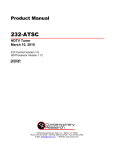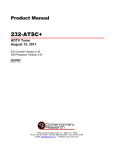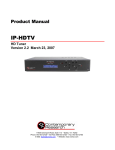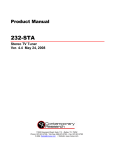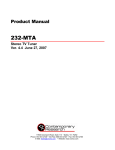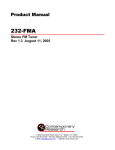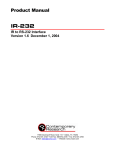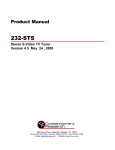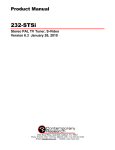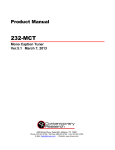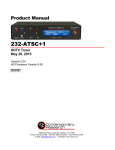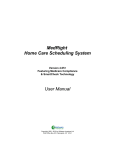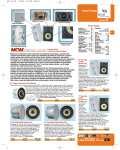Download Contemporary Research IP IP-HDTV IP-HDTV Product manual
Transcript
Product Manual IP-HDVR HDTV Tuner-Digital Video Recorder Version 2.3 March 23, 2007 17630 Davenport Road, Suite 113 • Dallas, TX 75252 Phone: 972-931-2728 • Toll-Free: 888-972-2728 • Fax: 972-931-2765 E-Mail: [email protected] • Website: www.crwww.com Table of Contents Overview .............................................................................................................................................................. 4 Specifications....................................................................................................................................................... 5 AV and Control Connection .................................................................................................................................. 7 RF..............................................................................................................................................................................7 AV Sources .................................................................................................................................................................7 AV Outputs.................................................................................................................................................................7 Digital Outputs............................................................................................................................................................7 Control .......................................................................................................................................................................7 Front Panel Setup ................................................................................................................................................ 8 Front Panel Menus ......................................................................................................................................................8 Display Formats ..........................................................................................................................................................9 Getting Started .................................................................................................................................................. 10 Front Panel Setup ..................................................................................................................................................... 10 Cable Box/AV Input Integration ................................................................................................................................. 10 AV Outputs............................................................................................................................................................... 10 Control ..................................................................................................................................................................... 10 On-Screen Menus ............................................................................................................................................... 11 Analog and Digital Tuning ......................................................................................................................................... 11 TV Guide Setup................................................................................................................................................... 12 Country ................................................................................................................................................................ 12 Cable/TV .............................................................................................................................................................. 12 Cable Box ............................................................................................................................................................. 13 Cable Box Code..................................................................................................................................................... 13 Confirm ................................................................................................................................................................ 13 Menu Setup ........................................................................................................................................................ 14 Channel Menus ......................................................................................................................................................... 14 EZ Scan Channels.................................................................................................................................................. 14 Edit Channels........................................................................................................................................................ 14 DTV Signal............................................................................................................................................................ 14 Channel Labels...................................................................................................................................................... 15 Input Source......................................................................................................................................................... 15 Troubleshooting .................................................................................................................................................... 15 Auto Demo ........................................................................................................................................................... 15 Option Menus ........................................................................................................................................................... 16 Audio Output ........................................................................................................................................................ 16 Audio Language .................................................................................................................................................... 16 Clock .................................................................................................................................................................... 16 Aspect Ratio.......................................................................................................................................................... 16 Menu Language .................................................................................................................................................... 16 DVI Level.............................................................................................................................................................. 16 Caption Menus.......................................................................................................................................................... 17 Caption Type ........................................................................................................................................................ 17 Caption Options .................................................................................................................................................... 17 Lock Menus .............................................................................................................................................................. 17 DVR Menus............................................................................................................................................................... 18 Caption Type ........................................................................................................................................................ 18 Program List ......................................................................................................................................................... 18 HDD Format.......................................................................................................................................................... 18 Record Quality ...................................................................................................................................................... 18 DVR Control ....................................................................................................................................................... 19 Manual Recording ..................................................................................................................................................... 19 Program List ............................................................................................................................................................. 19 Playback................................................................................................................................................................... 19 TimeShift.................................................................................................................................................................. 20 Video Clips ............................................................................................................................................................... 20 Clip Edit................................................................................................................................................................ 20 Clip Record ........................................................................................................................................................... 20 Contemporary Research 2 IP-HDVR HD Tuner-DVR TV Guide Operation ............................................................................................................................................ 21 Listings .................................................................................................................................................................... 21 Layout .................................................................................................................................................................. 21 Recording ............................................................................................................................................................. 21 Schedule – Favorites/Record...................................................................................................................................... 22 Sort ......................................................................................................................................................................... 22 Setup - Channels ...................................................................................................................................................... 22 HDV-RC IR Remote ............................................................................................................................................ 23 Ethernet Setup ................................................................................................................................................... 24 Ethernet Connection.................................................................................................................................................. 24 Reset IP Address ...................................................................................................................................................... 24 RS-232 and Telnet Terminal Communication ..................................................................................................... 24 Ethernet and RS-232 Control Protocol............................................................................................................... 25 Overview ................................................................................................................................................................ 25 General protocol specifications ............................................................................................................................ 25 Command String Structure .................................................................................................................................. 25 Terminal Communication Commands ......................................................................................................................... 27 HDV-RC Remote Emulation........................................................................................................................................ 28 Response Strings ...................................................................................................................................................... 29 IP Control Options ............................................................................................................................................. 30 RS-232 Display Control.............................................................................................................................................. 30 TCP and UDP Connectivity ......................................................................................................................................... 30 Web Control Page ..................................................................................................................................................... 30 RS-232 Cable Connections................................................................................................................................. 31 Single Tuner ............................................................................................................................................................. 31 Multiple Tuners ......................................................................................................................................................... 31 Rack Mounting ................................................................................................................................................... 32 Cable Box Codes................................................................................................................................................. 33 IP-HDVR FAQ ..................................................................................................................................................... 34 TV Guide FAQ ..................................................................................................................................................... 35 Safety Instructions ............................................................................................................................................ 37 Limited Warranty ............................................................................................................................................... 38 Contemporary Research 3 IP-HDVR HD Tuner-DVR Overview The IP-HDVR HDTV Tuner-DVR is an integrator-friendly HD tuner and Digital Video Recorder (DVR), controllable from Ethernet, RS-232, IR, and onboard Web pages. A universal tuner, the IP-HDVR can receive both ATSC and NTSC broadcasts from twin off-air antenna and cable RF inputs, decode clear-cable digital QAM channels, as well as control an external analog cable box for subscription-based programming. When integrating the IP-HDVR via Ethernet, a control system can also communicate with a video display or projector through the HD tuner’s RS-232 control port. Featuring a 120 GB hard drive, the IP-HDVR is also a powerful HD DVR, able to schedule recording from its TV Guide On Screen™ program guide (no monthly fees) or VCR Plus+ codes. The unit can also record and display digital video from IEEE-1394 ports or upscaled analog video from two AV inputs. In addition, users can pause and review live programs at their leisure. The tuner displays HD, SD, and analog broadcasts through Component, RGB, DVI, or composite video/SVideo outputs. View up to 2-megapixel quality video in 1080i, 720p, 480p, and 480i modes, in a variety of aspect ratios. Dolby 5.1 surround sound is available from an optical output, and variable- and fixed-level stereo audio ports. • • • • • • • • • • • • • • • • Receives ATSC HD, SD and NTSC off-air, as well as analog, HD, and unscrambled QAM cable channels simultaneously from TV and Cable RF inputs Records tuner and external AV to internal 120 GB hard drive Pauses live video programming for delayed playback and review Features subscription-free TV Guide On-Screen™ EPG for TV/Cable channel access and recording Accepts VCR Plus+ commands for digital recording Outputs HD,SD, and upscaled analog video to Component, DVI, RGB, or dual Video/S-Video ports Switches and upscales cable box and other external AV sources from two analog inputs Controls IR-format cable box for subscription-based programming Shares digital video with specific IEEE-1394 FireWire devices (Page 6) Links RS-232 control system communication to external video display when tuner is integrated via Ethernet Integrates easily over Ethernet, RS-232, discrete IR and wired IR ports, and included HDV-RC IR remote Offers Dolby 5.1 surround sound from optical digital output and two analog variable and fixed-level stereo outputs Sets up using front-panel control, easy on-screen menus, and control ports Displays closed-captioning text and on-screen channel names Mounts in 19" rack with optional RKHD kit Includes HDV-RC IR remote and cables for component, DVI, RCA stereo audio, and antenna Contemporary Research 4 IP-HDVR HD Tuner-DVR Specifications Physical Size (WHD): Weight: Enclosure: Mounting: Hard Drive: Tuning Tools: 17.0" [430 mm] x 3.0" [76.7 mm] x 12.8" [326 mm] 10.2 lbs [4.6 kg] Steel and aluminum with durable silver and black powder coat paint Shelf or rack-mount with optional RKHD Rack Kit) Internal 120 GB, approx. 12 hours HD, 24-119 hours SD quality video Gemstar TV Guide On-Screen™ electronic program guide for tuning and recording, and VCR Plus+ command Front Panel Display: IR: Control: Blue LCD, 2 lines of 20 characters each IR sensor, 57 kHz Buttons for Setup, Menu, Select, Exit, and Left, Right, Up, and Down operation Rear Panel TV In: Cable In: Cable IR: AV 1 In: AV 2 In: S-Video Out: 'F', female, 75 ohm ‘F', female, 75 ohm 1/8” stereo jack for cable box control 3 RCA female jacks, Video, Left, Right - AV source or cable tuner 3 RCA female jacks, Video, Left, Right - AV source Mini DIN 4-pin, Y - 1V p-p at 75 ohms, C - 0.286 V p-p at 75 ohms On-screen menu displayed when digital set to 480i AV 1 Out: 3 RCA female jacks, Video, Variable Left, Right audio AV 2 Out: 3 RCA female jacks, Video, Fixed Left, Right audio YPbPr Out: 3 RCA Pr, Pb, Y outputs (1080i/720p/480p/480i) Digital Audio: TOSlink optical output, Dolby Digital AC3 Service Port: DB-9 female RS-232 for factory service and firmware updates RGB Out: RGB DB-15 female (1080i/720p/480p) DVI Out: DVI-D with HDCP (1080i/720p/480p), HDMI video with optional adapter IEEE-1394: 2 4-pin data ports, i-Link/1394 Ethernet Control: 10/100baseT RJ-45 jack Ethernet LEDs: Right yellow LED indicates 100 baseT speed/10 baseT when off Left green LED indicates link, blinks with data activity RS-232 Control: DB-9 male, RS-232 data link to control system, PC, or RS-232 controlled display 300 to 115,200 baud (9600 default), 8 data bits, no parity, 1 stop bit IR In: 3.5 mm stereo input for external IR sensor or wired IR Discrete codes available Power In: AC power cord, 120 VAC, 60 Hz, 35W (not shown above) Contemporary Research 5 IP-HDVR HD Tuner-DVR Specifications Video Frequency Range: TV System: Tuning: Aspect Ratio: Captioning: Lock: NTSC, NTSC and Clear QAM (cable) television 55.25 to 801.25 MHz NTSC, ATSC DTV (1080i/720p/480p/480i) Off-air 2-69 and CATV 1-135 Adjustable, variety of modes for widescreen 16:9 and normal 4:3 broadcasts DTV, set by program or customized for size, font and display attributes Analog CC1-CC4, TT1-TT4, On/On with Mute/Off modes Parental option for channels and/or rating IEEE-1394 Devices Compatible only with makes and models below: Victor HM-DH30000 Panasonic NV-DH1, NV-DH2 Hitachi DT-DR20000, DT-DRX100 Toshiba A-HD2000 JVC HM-DH30000U Mitsubishi HV-HD1000 Sony IP-7, IP-55, IP-220 Includes RF loop cable RCA composite video audio cable Stereo RCA cable Component YPbPr cable HDV-RC IR Tuner Remote, 2 batteries (AA) Options RKHDV Kit for mounting single unit in 19" rack (2RU) CC-232 RS-232 Cable Contemporary Research 6 IP-HDVR HD Tuner-DVR AV and Control Connection RF TV Antenna Cable F connector for off-air MATV signals F connector for CATV input The IP can receive both at the same time, when the TV Guide is set to receive Cable; the tuner will first search for analog cable channels, then digital off-air broadcasts, and then goes back to cable to search for digital cable broadcasts. AV Sources AV IN 1 AV IN 2 Cable Box IR Out RCA composite video, and stereo audio inputs – upscaled to HD output settings, also used for Cable Box AV input Composite, S-Video, and stereo audio inputs – upscaled to HD output settings 1/8” mini jack connects G-Link cable for controlling cable box. AV Outputs AV 1 AV 2 S-Video and RCA composite video and fixed-level analog audio outputs. Video is switched with HD output, audio is always present RCA composite video and variable-level analog audio outputs. Video is switched with HD output, audio is always present Digital Outputs YPbPr Optical Audio RGB DVI IEEE-1394 3 RCA Pr, Pb, Y outputs (1080i/720p/480p/480i) TOSlink optical output, Dolby 5.1 or PCM digital audio RGB DB-15 female (1080i/720p/480p) DVI-D with HDCP (1080i/720p/480p), HDMI video with optional adapter 2 4-pin data ports, i-Link/1394 Control Service RS-232 Ethernet IR In RS-232 port for factory upgrades only DB-9 male acts as programming and control system port, also acts as pass-through control port to video display, when control system integrated via Ethernet RJ-45 connection offers bi-directional IP Telnet control and access to Web page Input accepts wired IR from control system, external IR-RXC sensor, or ChannelPlus, Audioplex, SpeakerCraft, or Xantech remote IR sensors Contemporary Research 7 IP-HDVR HD Tuner-DVR Front Panel Setup There are a number of parameters that can be set by front-panel Setup commands. In normal operation the Up/Down arrows select channels, and the Left/Right arrows adjust volume. • • • • • Pressing Setup enters the setup menus, shows last menu accessed (The Menu button accesses on-screen menus) Pressing Up and Down arrow keys steps through the IP-HDVR options (Tip: Press Up to access output, Down to jump to IP menus) Pressing Left and Right keys steps through options for each front-panel menu Press Select to save desired option Pressing Exit or Setup exits the front-panel setup mode Front Panel Menus Menu Parameters Output RGB DVI Component Video 1080i 720p 480p 480i (Component output only) Variable 1 Variable 2 Variable 3 Native Format Baud Com RS-232 CRTL Contemporary Research See chart on next page for more information 300 9600 (default) 600 19.2K 1200 38.4K 2400 57.6K 4800 115.2K 8,N,1 (default) 8,M,1 8,0,1 8,S,1 8,E,1 7,M,1 8,N,2 7,S,1 7,0,1 7,E,1 7,N,2 0=Disable 1=Enable (default) 8 IP-HDVR HD Tuner-DVR Front Panel Setup Menu Parameters Unit Panel Lockout 1-9 None (Default) Ch+Menu Vol+Menu Ch+Vol+Menu Pwr Setup Menu All Setup+Menu Pwr+Set+Menu IR Receive Display Line 2 IP Port Gateway Subnet Mask IP Address IP Mode Firmware MAC Add Cursor buttons active for Setup or Menu modes, Exit returns buttons to current locked or unlocked status 0 - No IR reception 10 - Normal (Default) Normal – Time, Air/Cable input, Control Function Lights – represents status LEDs (LA: RX: TX: IR ) Link/Act status, RS-232 RX and TX, and IR In IP port for Telnet communication - Left/Right steps through number positions (blinking cursor position), Up/Down enters number 0-9, Select saves, Exit leaves edits, stays at current menu Quad address – Left/Right steps through number positions (blinking cursor position), Up/Down enters number 0-9, Select saves, Exit leaves edits, stays at current menu Quad address - Left/Right steps through number positions (blinking cursor position), Up/Down enters number 0-9, Select saves, Exit leaves edits, stays at current menu Quad address – Left/Right steps through number positions (blinking cursor position), Up/Down enters number 0-9, Select saves, Exit leaves edits, stays at current menu (192.168.001.231=default, 0.0.0.0 = DHCP) Selects Static (default) or DHCP IP modes Shows version IP-HDVR V1.5 Shows network MAC address Ex: 0014C8 00 0001 (last 2 bytes is the serial number) Display Formats The Display Format setting direct how the IP-HDVR will output the signal in response to different formats in broadcast programming. Code 0 1 2 3 4 Display Format 1080i 720p 480p 480i Variable 1 5 Variable 2 6 Variable 3 7 Native Contemporary Research Broadcast Format All All All All 1080i 720p 480p/480i 1080i/720p 480p/480i 1080i/720p 480p/480i 1080i 720p 480p 480i 9 Output As 1080i 720p 480p 480i 1080i 720p 480p 1080i 480p 720p 480p 1080i 720p 480p 480i (YPbPr), 480p (RGB, DVI) IP-HDVR HD Tuner-DVR Getting Started Here’s a brief overview of the steps needed to integrate the IP-HDVR. Front Panel Setup Use Front Panel Setup to select output, format, RS-232 parameters, and/or Ethernet settings. RF Input • • • • Connect TV Antenna and/or Cable RF feeds. TV Guide Setup will determine if tuner will search for off-air only or cable analog/digital and off-air digital channels. After TV Guide Setup (p10), use Channel Menus to search, screen, and test broadcast channel operation. Use TV Guide Channel Setup (p19) to filter channels displayed in the Program Guide. Cable Box/AV Input Integration • • • • • Connect Cable Box AV output to: o AV IN 1 inputs o Cable input for AV on channel 2, 3, or 4 Connect G-Link IR cable to Cable Tuner IR Out Attach IR emitter to underside of cable box, IR emitter below the box’s IR sensor TV Guide Setup will link tuner to input and IR codes for cable box control If you are not connecting a cable box, both AV inputs can be switched through the tuner AV Outputs • • • • • Connect high-definition display to Component, RGB, or DVI outputs (Use optional adapter to connect an HDMI source to the DVI output) Connect video display to AV 1 or AV 2 outputs The IP-HDVR can switch between HD and video outputs (no video is present when an HD video output is selected) Connect audio equipment to Optical and/or analog outputs – AV 1 is fixed, AV 2 is variable Audio is always present for all outputs Control • • • • Contemporary Research 10 Connect Ethernet or RS-232 control cable to control system Use front-panel menus to set IP address or RS232 parameters The IP-HDVR can also provide pass-through bidirectional control of a display through the RS232 control port when the tuner is integrated via the Ethernet port For IR control, connect external IR sensor or wired IR system control port to IR IN, discrete IR codes are available in AMX, Crestron, and Pronto format IP-HDVR HD Tuner-DVR On-Screen Menus On-Screen Menus HDV-RC IR Remote The remaining tuner capabilities can be set up by easy-to-use on-screen menus. The menus can be accessed from the HD-RC IR remote control using the Menu, Arrow, Select ( ), Surf, and Exit buttons. You can also use similar buttons on the IP-HDVR front panel. • • • • • • Menu – Displays the first level of the on-screen menu, step backward from menu levels TV Guide – Displays the TV Guide On Screen Electronic Program Guide (EPG) Arrows – Use up/down keys to select main menus, left/right arrow keys to move through submenus Select – Can step forward into sub-menus or confirm an action, the button in the center of the directional arrows is the same function as Select Surf – Selects channels for surf list in Edit Channel mode, steps through favorite channels in normal operation Exit – Exits menu Analog and Digital Tuning One of the biggest paradigm shifts in digital TV is how channels are accessed. Gone is the familiar Channel 33. Now you have 33-0, 33-1, 33-2, and so on. In a nutshell, the new tuning options are: • • • • Analog Channels. Entering the number-0 accesses the traditional analog TV channel. Digital Channels. Entering the same channel-1 tunes the digital equivalent of the analog channel. Note that the digital channel is broadcast on a UHF frequency. Digital tuners see the channel ID (NN1) in the signal and lists by that name instead of the actual frequency. This way, the broadcasters keep their channel identity, even when analog goes away. Multicast Digital Channels. Because digital is more compressed than analog, broadcasters are often including additional sub-channels, listed as NN-2, NN-3; up to 6 if the station is only broadcasting SD quality programming. Two-Digit Tuning. If you are currently watching a digital channel, entering the old channel format, such as 33, will access 33-1. If you are watching an analog channel, entering 33 will take you to 33-0. Contemporary Research 11 IP-HDVR HD Tuner-DVR TV Guide Setup It’s essential to setup TV Guide when you first install the IP-HDVR. The settings determine how EZ Scan searches for channels. If the Guide is set for off-air, the tuner will not look for cable channels. If you set the Guide for Cable, it will look for analog cable channels (CATV) then digital TV channels (DTV) it will return to the Cable input and search for digital cable channels (DCATV). The following section covers the primary setup screens – there are a number of screens not shown that will be obvious in function. Country Press TV GUIDE, then MENU to enter the top menu bar. Press the RIGHT ARROW key to select SETUP, then cursor down to Change System Settings. Press SELECT to begin setup process. Select USA or Canada. ZIP Enter ZIP code. Use LEFT and RIGHT arrows to position cursor, UP and DOWN to change numbers. Cable/TV Contemporary Research Select Cable or TV-only operation. 12 IP-HDVR HD Tuner-DVR TV Guide Setup Cable Box If you choose Cable, and also indicate that you have an attached cable box, you can define if the video will be sent via channel 2-4 or to the AV 1 input. Cable Box Code The next screen will ask for the make of cable box. TV Guide supports 60 brands of cable boxes, a complete list is provided at the end of this manual. There additional screens to try out codes for boxes not listed, and to test control operation. Confirm At the end of the process, you’ll have the option of confirming the information, or to redo the operation. You can change TV Guide settings at any time. This screen will appear when you enter TV Guide Setup. Contemporary Research 13 IP-HDVR HD Tuner-DVR Menu Setup Channel Menus EZ Scan Channels Before starting scan, set up TV Guide for off-air or cable operation. To receive both off-air and cable, set TV Guide for cable operation. • • • • Press MENU to display the menu window Press SELECT or f to select the EZ Scan menu Use the ARROW keys to select off-air (Antenna) or CATV (cable) format Press SELECT to enter format and begin auto-scanning Note that re-scanning channel will erase Favorite Channel and Surf settings. Go to Channel Edit to restore settings. Edit Channels The Edit Channel window is useful, easy tool for managing your favorite channels. The active channels (black) on the list will be selected when you send Channel Up and Channel Down commands. The inactive channels can still be selected from direct numeric channel access commands (xx-xx) • Select the Ch Edit menu • Use the left/right arrows to select a channel group TV (analog TV), CATV (analog cable), DTV (ATSC TV) , CADTV (ATSC cable) • Highlight an active channel (black text) with arrows • The IP-HDVR will display the highlighted channel • Press SELECT to remove (dimmed text) or restore a channel to the channel list • Press SURF to add to Surf list • Press MENU to exit channel editing DTV Signal Press to view signal level of the current channel. Same as the Signal IR and RS-232 command. Identical to Signal command on remote or RS-232. The Signal icon is real-time, so you can adjust antenna for best reception. Contemporary Research 14 IP-HDVR HD Tuner-DVR Menu Setup Channel Labels Add TV channel logo, used when channel number is displayed or Info button is pressed. Use arrows to navigate icons, press Select to choose icon. Change channels using Channel Up and Down on remote or RS232 commands. Input Source Select current source: • • • • Digital channel – current digital channel Analog channel – current digital channel AV1 input AV 2 input When you access the menu, the current source on screen will be checked. Troubleshooting This menu accesses an interactive troubleshooting guide for basic tuner problems. For example, selecting “Unable to receive TV Signal” will display an option to re-scan TV channels. Auto Demo Plays a stored demonstration video Contemporary Research 15 IP-HDVR HD Tuner-DVR Menu Setup Option Menus Audio Output Selects Dolby digital or PCM digital audio output Audio Language Selects English, French or Spanish languages Clock Use the Left Arrow button to select the year. TV Guide will insert clock time. Aspect Ratio Select to choose the default aspect ratio. The Ratio command will rotate through the same options, but the tuner will revert to the default ratio when the channel is changed. 16:9 Widescreen, 170p, 1080i output Set by Program, Standard, Expansion, Shrink, and Cinema Zoom 4:3 Standard Video, 170p, 1080i output Set by Program, Normal, Wide, Spectacle, Zoom 1, Zoom 2, and Cinema Zoom (2.35:1) 16:9 Widescreen, 480P, 480i output Set by Program, Letter Box, Cropped, or Squeezed Menu Language DVI Level Contemporary Research English, French, or Spanish Normal and Expanded (recommended) 16 IP-HDVR HD Tuner-DVR Menu Setup Caption Menus Caption Type Select Caption Type: • • • Caption Options Off CC 1-4 Text 1-4 Select Caption style: • • • • • • • • • Style – Set by Program or Custom Size – Standard (15 pixels), Large (21 pixels), or Small (11 pixels) Font – Select from 8 font styles Text Color – Choose from 8 colors Text Opacity – Solid, Flashing, Translucent, Transparent Edge Color – colors for selected edge type Edge Type – None, Raised, Depressed, Uniform, Left Shadow or Right Shadow Background Color - Choose from 8 colors Background Opacity - Solid, Flashing, Translucent, Transparent Lock Menus Blocks access to inputs and channels • • • • • • • Contemporary Research Lock System – Activates parental control Set Password – Enter 4-number password Block Channels – Select specific channels from the channel list Movie Rating – Select one or more ratings for blocking TV Rating-Children – Choose filtering by Age and Fantasy Violence levels TV Rating-General – Choose filtering by Age, Dialog, Language, Sex and Violence Aux Block, Inputs AV 1 and AV 2 17 IP-HDVR HD Tuner-DVR Menu Setup DVR Menus Caption Type Displays the on-screen TV Guide. More information available in the TV Guide System section. Program List Displays list of recorded Programs. The graphic list displays a title, file information, and a thumbnail image for each file. • • • • • Play Delete Title Edit (On-screen keyboard) Detail (File information) DVHS Out – record to IEEE-1393 device HDD Format Select only if you want to delete all programs from the hard drive. Record Quality Preset the recording quality for the DVR from analog broadcasts and AV inputs. Recording quality for digital programs is preset. • • • • • • Best (24 hours) High (34 hours) Medium (64 hours) Basic (119 hours) HD digital (21 hours) SD digital (85 hours) Actual recording hours above vary slightly according to content variables. In addition, the Demo video cannot be erased, so actual HDD space is less than 120 MB. HD broadcasts average about .094 GB per minute, similar to Best; SD recordings use about .024 GB per minute. Contemporary Research 18 IP-HDVR HD Tuner-DVR DVR Control Manual Recording • • • • Send the REC/EDIT IR or RS-232 command Press the UP/DOWN arrows to set recording from No Limit, 30, 60, 90, 120, 180, or 210 minutes For No Limit, recording will continue until you send a STOP or HDD is full Press REC/EDIT or SELECT to display elapsed time record meter (does not show in recording) – press EXIT to clear display Program List • • • Send PROGRAM LIST to display on on-screen list of titles (also available from the DVR menus) Use the LEFT/RIGHT arrow keys to scan through the list Use the DOWN arrow keys to display more options for each title, including o PLAY – play title o DELETE – delete title o TITLE EDIT – edit title with on-screen keyboard o DETAIL – more info, including file size o DVHS OUT – backup to DVHS Playback Standard Control Several control options are available for playback of recorded (and timeshifted) programs. • • • • • • • • Smart Control • • • Contemporary Research 19 PLAY begins playback PAUSE will pause the playback STOP will exit playback and return to current broadcast REW and FF can scan forwards or back from X2 to X300 speeds Press PLAY/SLOW for slow-motion during playback The START and END buttons will jump to the start or end of the program Press REPEAT once to set a start point in the playback, then later to set an end point Section will repeat until you press END or REPEAT (you can use REW, FF, SKIP and DRAG to set the points SKIP FWD and BACK looks at scenes to find transition points, handy for skipping commercials DRAG FWD and BACK is a fast way to move through the program – just hold down to jump to a new point. SYNOPSIS is an auto SKIP search, stopping briefly at points, then moving on IP-HDVR HD Tuner-DVR DVR Control TimeShift This feature gives you the ability to pause a live program for later review. The video is saved in temporary HDD memory, and will continue until HDD is out of space. • • • • Activate the TIMESHIFT function. The program will begin recording in the background During the session, you can press TIMESHIFT again to set a Bookmark (Blue) you can return to during playback, pressing TIMESHIFT later on will set a new bookmark (Green) During playback, press the BLUE or GREEN buttons to jump to the Bookmarks Video Clips Clip Edit There are two ways you can lift video clips from recorded or TimeShifted programming • • • • • During playback of a recorded segment, press REC/EDIT to set a start point for a video clip, then press REC/EDIT at the end of the section you want to mark. You can use FF, SKIP, and DRAG to move quickly to the next point You can create 10 separate clip points within a given program Press STOP to end the clip session Then make one of three responses to the onscreen menu o Save the marked clips as separate programs o Undo – clip marks are ignored o Cancel – cancel all clips and watch program Only the selected clips are saved, the original, remaining programming is discarded. Only use STOP to end session – if you press POWER, the clips may not be saved. Clips need to last at least 10 seconds. Clip Record This function is similar, used while a program is being recorded in TimeShift mode. • • • Press REC/EDIT during a TIMESHIFT session to set clip start and end points Repeat to set other clip points Press STOP to stop the TIMESHIFT and save the clips The selected clips are saved, the original, remaining programming is saved in temporary TimeShift memory. Only use STOP to end session – if you press POWER, the clips may not be saved. Clips need to last at least 10 seconds. Contemporary Research 20 IP-HDVR HD Tuner-DVR TV Guide Operation Listings Layout The TV GUIDE command displays a graphic channel Guide. You can navigate the listings using your arrow keys. The page is divided into three general sections; Menu Bar, Video/Ad frame, and Info frame. You can access the top Menu Bar by pressing MENU, then pressing Right or Left arrow. • • • • • • Listings – show by channel and time Sort – show by category Promotions – display promotions Setup – select setup options Messages – display list of messages Schedule – Favorite and channels set for recording The Video/Ad frame on the left displays current channel video at the top and two Features and Ad panes. The Info frame shows the details selected by the Menu Bar. You’ll notice that channel listings are coded by color: • • • • Green – Sports Purple – Movies Blue - Children’s Teal - Other The TV Guide channel listings may not presently include all local channels. Some small or independent stations may not be listed in the Guide database, and some stations may not be broadcasting digital program information as yet. Recording When a title is selected, you’ll see an expanded listing below that includes Station, time slot and program information. The listing also activates three softkey functions. • • • BLUE Button = Add to Favorite TV Program list GREEN Button = Start Recording o GREEN cancels recording o BLUE select frequency Once – this time only Regularly, whenever program appears on the same time and channel Weekly – when it appears on the same day and time Info Button = displays full program information Custom touch panel designs should include similar BLUE and GREEN softkey icons, as they are used to access for several features in TV Guide. Contemporary Research 21 IP-HDVR HD Tuner-DVR TV Guide Operation Schedule – Favorites/Record Select the Schedule option on the top menu bar. This displays a list of Favorite programs or those scheduled for recording. Using this tool, you can easily remove programs from the Favorites list, or change the frequency (Once, Regularly, or Weekly). You can also view the list of programs listed for recording, and change the frequency (recording cycle) or delete from the schedule. Sort The Sort menu simplifies finding programs you want to record. Select Sort from the top menu, move down one step to the Sort menu, and pick: • • • • • • • • • Alphabetical Movies Sports Children Educational News Variety Series HDTV The screen will display a list of programs by sorted by category. Setup - Channels To screen channels displayed in the TV Guide, go to the Setup option on the top menu, then cursor down and select Change Channel Display. Use the arrow keys to highlight any channel, then use the GREEN and BLUE keys to remove a channel from viewing in TV Guide. Contemporary Research 22 IP-HDVR HD Tuner-DVR HDV-RC IR Remote The HD-RC IR Remote included with the IP-HDVR can be used to setup the tuner and for daily operation. All of the functions on the remote have equivalent commands in RS-232, Ethernet, and Wired IR formats. In addition, the IP-HDVR front panel buttons can perform Power, Channel, Volume, and Menu control. Power Turns tuner on and off. Discrete on and off IR commands are available as well. Volume Control Use the Vol+, Vol- and Mute buttons Channel Selection The key change in digital tuning is the need to add a dash (-) and number after the traditional channel number. Analog channels are accessed using XX-0, digital channels using XX-1 (or -2, -3, etc). Ch+, Ch- and PrevCh can be used to access and recall channels. The Surf button in the Menu section can step through a list of favorite channels. Menu Operation Press Menu to access the on-screen menus. Use the directional arrows, Surf, Select and Exit to navigate the menus. The ~ button in the center of the directional arrows is the same function as Select. Special Functions • CC steps through available closed-captioning options • Audio selects Mono, Stereo, SAP analog audio output modes • Signal displays an on-screen signal strength meter • Ratio steps through aspect ratios, options depend on channel and output types Guides • Info launches on-screen information window • Station opens up the Station Guide • Date selects the Date field in Guides • Pgm displays the Program Guide Contemporary Research 23 IP-HDVR HD Tuner-DVR Ethernet Setup Ethernet Connection The IP-HDVR typically communicates over a network using a static IP address, and is shipped set to a default address: IP Address: 192.168.1.231 Subnet Mask: 255.255.255.0 Gateway Address: 000.000.000.000 Local Port set to 23 (Telnet standard) Odds are, at least the IP address will change when the IP-HDVR is connected to the client’s network. One your first steps will be to obtain a static address from the client’s IT department, as well as an external gateway IP address if you intend on supporting the system from your office or anywhere outside the site’s firewall. Once you change the settings, create a label noting the settings and attach to the back of the IP-HDVR. Reset IP Address Since its possible another network device is using the default IP address, the best approach is to enter the new settings offline, outside the network. You can use one of two, requiring one of two offline options: 1. 2. Direct PC Connection. Use an Ethernet “Crossover” cable to make a direct connection to the IP-HDVR Ethernet port and your PC. Two pairs of wires are reversed at one end to create a direct send/receive path for data. Hub or Switch Connection. Another approach for connection is to use a standard Ethernet hub or switch between your computer and the IP-HDVR. Using standard Cat5 Ethernet cables, connect your PC to one port, and then connect the IP-HDVR to the second port. RS-232 and Telnet Terminal Communication You can communicate with the IP-HDVR with HyperTerminal using an RS-232 or TCP/IP connection to Port 23. Contemporary Research 24 IP-HDVR HD Tuner-DVR Ethernet and RS-232 Control Protocol Overview The IP-HDVR full duplex Ethernet/RS-232 scheme enables a system programmer to control all TV Tuner functions as well as monitor 3 groups of TV Tuner status. All commands are sent as ASCII strings. No delays between characters or commands are required, as data is interrupt driven and buffered. The 3 status groups are: Channel/Source Select, Audio Levels/Mode and Front Panel. The Mute A/V buttonfunction status from the IP-HDVR front panel has been grouped with the Channel/Source for simplicity in the most common modes of operation. Each of the groups has one ASCII status response string containing all of the status data for that group. The current status string of a group is sent from the IP-HDVR whenever a valid command for that group is received by the IP-HDVR RS-232 port or front panel. A group's status may be requested at any time via the RS-232 port. Status of all 3 groups is sent at power up. The format of each group's status response string remains the same always. Up to 9 IP-HDVR units may be cabled together and addressed for individual control from a single RS-232 port. Each IP-HDVR is assigned a unique unit code. Communications parameters (Front Panel Mode 1) are 300 to 9600 baud, 8 data bits, No parity, and 1 stop bit. Factory default is 9600 baud, Unit#1. All settings are saved to NVRAM in the IP-HDVR. The tuner will accept non-standard RS-232 control such as voltage that swings from 0 to +5 VDC, commonly found when IR ports are used to send RS-232 commands. General protocol specifications Characters in command strings to the IP-HDVR are common ASCII keyboard characters. Command strings sent to the IP-HDVR begin with the ASCII > (greater than symbol) as an 'Attention' character and end with carriage return - ASCII CR, Hex $0D, or keyboard Enter - as an 'End-of-command' character. Responses from the IP-HDVR begin with the ASCII < (less than symbol) as an 'Attention' character and end with a carriage return followed by line feed an ASCII LF or Hex $0A as 'End-of-command' characters. A carriage return is required at the end of each command and is assumed in all examples. Command String Structure [Attention] (Unit#) [Command] (Parameters) [Return] Attention Unit# Command Parameters Return Single character (>) starts the string The Unit# is expressed as an ASCII 0-9 when used in multiple tuner applications. To address all units, use a Unit # of 0 (Zero) No unit number will default to Unit#1 A two-character command Added attributes to some commands A carriage return ends the command string, you may use ASCII CR, Hex $0D, or keyboard ‘Enter’ in programming. For simplicity, the programming examples in the manual will not show the ‘CR’ – so remember, you’ll need to add it in your control code. Contemporary Research 25 IP-HDVR HD Tuner-DVR Ethernet and RS-232 Protocol Code IP= Function Data IP Address IG= IP Gateway IM= IP Subnet Mask IY= IP Mode IX= Telnet Port S4= Front Panel Set front panel lockout mode Q5= Set IR Receive mode KK=105 KK=106 KK=107 KK=108 KK=109 KK=110 KK=111 KK=89 P1 P0 PT XX XM XT Menu Arrow Right Arrow Left Arrow Up Arrow Down Select Exit Help Power On Power Off Power Off/On Power On Power Off Power Off/On Tuning Select tuned channel TC= TU TD TP KK=88 Tune channel up Example: ‘>3TU’ Tune channel down Previous channel Surf Contemporary Research Operation IP returns the current MAC address, current IP address, subnet mask, and gateway. Response example (S or D at end of IP signifies DHCP or Static address): $MAC=0014C8000001 / 1 $IP=192.168.001.231S IG=000.000.000.000 IM=255.255.255.000 IY=1 IP=xxx.xxx.xxx.xxx Defines IP address, then sends status (0.0.0.0 = DHCP) IG Returns current MAC address and IP information IG=xxx.xxx.xxx.xxx Defines IP gateway, then sends status IM Returns current MAC address and IP information IM=xxx.xxx.xxx.xxx Defines IP subnet mask, then sends status IY Returns current mode IY=1 Static (default) IY=2 DHCP IX Returns current Telnet port (00023 default) IX=xxxxx Defines Telnet port 0 None 1 Ch+Menu 2 Vol+Menu 6 Menu 3 Ch+Vol+Menu 7 All 4 Pwr 8 Setup+Menu 5 Setup 9 Pwr+Set+Menu 0 - No IR reception 10 - Normal (Default) Opens on-screen menus Arrow Right Arrow Left Arrow Up Arrow Down Select Exits menus Displays Menu Help screens On Standby, mutes audio and video Power toggle On (same as 232-series Mute Off) Standby (same as 232-series Mute On) Power toggle (same as 232-series Mute Toggle) Tunes analog (xxx-0) and digital (xxx-1) channels Examples: ‘>TC=28:1’ Selects channel 28-1 ‘>TC=28-2’ Selects channel 28-2 ‘>TC=32’ Selects channel 32-1 (if current channel is digital) Selects next higher channel in channel list Bumps Unit#3 tuned channel up Selects next lower channel in channel list Selects previously viewed channel Selects next channel up in Surf list, cycles to beginning 26 IP-HDVR HD Tuner-DVR Ethernet and RS-232 Protocol Code KK=82 KK=80 KK=81 KK=115 Function Display Ratio Operation R4= Freeze Signal Closed captions Audio Ramp volume up Ramp volume down Volume Mute off Volume Mute on Example: ‘>VM’ Stop volume ramp Toggle Volume Mute Audio Mode Status Request Request Q Mode status Request Front Panel status Request Channel status Example: ‘>ST’ Request AV status RS-232 Control RS-232 Control R5= Baud Rate R6= Comm Parameters VU VD VX VM VV VT KK=85 SQ SS ST SV Steps through aspect ratios, options depend on channel and output types Freeze image, toggles Displays an on-screen signal strength meter Steps through captioning options Starts volume ramping up Starts volume ramping down Restores audio volume to previous level Turns off audio outputs Mutes audio outputs Stops volume ramping Alternates audio mute on and off Step through audio mode options for mono, stereo, SAP Unit sends “Q” Mode status string Unit sends “S” Front Panel status string Unit sends “T” Channel/Source status string Returns Channel/Source status response string Unit sends “V” Audio status string 0=Disable 1=Enable (default) 1=300 6=9600 (default) 2=600 7=19.2K 3=1200 8=38.4 4=2400 9=57.6 5=4800 10=115.2K 0=8,N,1 (default) 11=8,M,1 1=8,0,1 12=8,S,1 2=8,E,1 13=7,M,1 3=8,N,2 14=7,S,1 8=7,0,1 9=7,E,1 10=7,N,2 A carriage return is required at the end of each command and is assumed in all examples. The ‘=’ sign for parameters may be omitted if desired, though it is helpful for clarity in checking programming. Terminal Communication Commands EF EN Echo Off Echo On ID Z! Product ID Zap Contemporary Research Characters received will not be re-transmitted (power up default). Characters received will be re-transmitted. Example: ‘>EN’ Characters received will be re-transmitted. Returns the product model number and firmware version. Reconfigures unit for all factory default settings. 27 IP-HDVR HD Tuner-DVR Ethernet and RS-232 Protocol HDV-RC Remote Emulation You can also emulate IR commands sent from the HDV-RC Wireless Remote. If you are using the numeric keys to select a channel, the user or program will need to follow the numeric command with an Enter. . KK=<key> * = Reserved for future products/applications 0=* 1=Play 2=Stop 3=Pause 4=Rew 5=FF 6=End 7=Start 8=Rec 9=Power (tog) 10=0 11=1 12=2 13=3 14=4 15=5 16=6 17=7 18=8 19=9 20= 21=Enter/Select 22=Ch Up 23=Ch Dn 24=Vol Up 25=Vol Dn 26=Vol Mute (tog) 27=Power On 28=Power Off 29=Menu 31=Input 58=Repeat 61=Station* 62=Date* 63=TV Guide 64=ezAdd* 65=1394 66=VCR+ 67=Blue Button 68=Green Button 69=System Power* 78=Clear* 79=Mode* Contemporary Research 80=Freeze 81=Signal 82=Ratio 83=Format 84=Angle* 85=Audio 86=Subtitle* 87=Bookmark* 88=Surf 89=Help* 90=TimeShift 91=Prog List 92=Synopsis 99=Dash 100=Info 101=FlashBk 102=Timer Reset* 104=Top Menu* 105=Menu 106=Cur Rt 107=Cur Lt 108=Cur Up 109=Cur Dn 110=Enter/Select 111=Exit 112=Top Menu* 114=Setup* 115=CC 116=Timer/Info* 141=Format 1080i 142=Format 720p 143=Format 480p 144=Format 480i 145=Format Var1 146=Format Var2 147=Format Var3 148=Format Native 149=Output RGB 150=Output DVI 151=Output YPbPr 152=Output Video 28 IP-HDVR HD Tuner-DVR Ethernet and RS-232 Protocol Response Strings Typical: [Attention] [Unit#] [data ...data] [cr] [lf] IP-HDVR status response strings contain ASCII characters similar to those used for the same functions in command strings. An ASCII 'carriage return' and ‘line feed' follow each response string. Functions shown as NA are not applicable or available in the IP-HDVR; characters will appear in status strings as lower-case x. Channel/Source Status Response String (T): Start # CMD 1-9 < 1 Power U=On M=Off T Major Channel 3 digits Video Mute Unmuted 032 U U Input RF 0=Channel 1=AV1 2=AV2 A=Air C=Cable 0 A NA Minor Channel 3 digits NA 002 x x Function 0=None 1=Play 2=Stop 3=Pause 4=FFwd 5=Rew 8=Rec 9=TimeShift 2 For compatibility with 232-series tuners, 232-ATSC (XXX-XX) channels are split into Channel 1 (Major) and Channel 2 (Minor) sections. Audio Status Response String (V): Start Unit CMD 1-9 < 1 Power Volume 1 Volume Mute Stereo Volume 2 U=On M=Off 0-63 Emulated level 2 digits 63 U=Unmuted M=Mute N/A 0-100 Actual level 3 digits U x 100 V U Volume 1 emulates 232-series volume level for compatibility with existing applications. Volume 2 shows actual IP-HDVR level, from 0-100 steps. Front Panel Mode Status Response String (S): Start Unit CMD 1-9 < 1 S Audio Tune Mode Lockout Bass Treble Output Ratio Current Ratio Mode NA N/A N/A 1 digit 0-9 Fixed 2 digits Fixed 0=RGB 1=DVI 2=YPbPr 3=Video 1-7* 4 digits x x 1 08 4 1 0-3 0=1080i 1=720p 2=480p 3=480i 1 6 xxxx Current Ratio is the actual output ratio; Ratio Mode is the selected mode (see chart on page 9) Q Mode Response String (Q): Start < Unit 1-9 CMD 1 Q Q0 N/A Q1 N/A Q2 N/A Q3 N/A Q4 N/A x x x x x Contemporary Research 29 Q5 IR 0=Off A=Normal A N/A 4 digits xxxx IP-HDVR HD Tuner-DVR IP Control Options RS-232 Display Control An IP-HDVR that is controlled over Ethernet can also offer a pathway for IP-driven RS-232 control to a display or projector. This application takes advantage of the fact that multiple Telnet ports can communicate over the same TCP connection. • • • • Set the control system to communicate with the IP-HDVR over Ethernet through Telnet Port 23, or a different Telnet port you’ve defined in the IP-HDVR for control. Set the control system to control the display over Ethernet using Telnet Port 2001, same IP address as the IP-HDVR. The IP-HDVR will pass data to and from the Telnet port 2001 through the RS-232 control port on the back. This connection offers full bi-directional control of the display. The RS-232 baud rate can be changed via front-panel settings or programming, presently fixed at 8 data bits, no parity, one stop bit. TCP and UDP Connectivity The IP-HDVR can be controlled via TCP or UDP protocols. In most cases, a control system Ethernet port will be set to connect using TCP/IP, which provides direct, two-way communication between the tuner and the control system. System programmers could opt to use UDP protocol instead, which is useful for simple, one-way control or broadcasting control commands to all IP-HDVR tuners on the LAN. The tuners can send status information back via UDP, but system programming will need to read the strings to interpret which IP address is sending the data. Check with CR Support for more information on this option. The IP-HDVR can communicate over both UDP and TCP protocols, no special settings or programming is required. Web Control Page The IP-HDVR features on onboard Web page for remote IP control of the tuner, accessed by entering the IP address of the tuner in a standard Web browser. Simply click on the Web panel buttons to control the tuner, and the text area at the top will provide system feedback. Contemporary Research 30 IP-HDVR HD Tuner-DVR RS-232 Cable Connections Single Tuner Control Wiring – Single Unit RS-232 Control Port 5 GND 2 RXD 3 TXD GND TXD RXD Channel Up Channel Down 5 3 2 4 9 9-pin D-sub female RS-232 wiring for control or programming should only use pins 2, 3, 5. Cables with all pins wired can lock out front-panel programming and data communication (Pins 4 and 9 are inputs). Multiple Tuners Up to nine tuners can be daisy-chained from one RS-232 control port. Remember that you will need to use the Unit# address in your programming when you control more than one tuner from the same control port. Set the first unit in the RS-232 chain to the highest Unit#, then wire in sequence to the last tuner in the chain. The reason for this is that CR tuners use an intelligent data bus - the highest number tuner receives all commands, and then passes on commands addressed to tuners with lower unit numbers. The next tuner in the chain does the same, and so on until the last unit. RS-232 Wiring – Two Units RS-232 Control Port 5 GND 2 RXD GND 5 TXD 3 3 TXD RXD 2 GND 5 TXD 3 RXD 2 Unit 2 9-pin D-sub female Unit 1 9-pin D-sub female RS-232 Wiring – Three Units RS-232 Control Port 5 GND 2 RXD GND 5 TXD 3 3 TXD RXD 2 GND 5 TXD 3 RXD 2 GND 5 TXD 3 RXD 2 Contemporary Research 31 Unit 3 9-pin D-sub female Unit 2 9-pin D-sub female Unit 1 9-pin D-sub female IP-HDVR HD Tuner-DVR Rack Mounting RKHDVR HD Rack Kit • • • Attach IP-HDVR to RKHDVR shelf Mount RKHD into 19” equipment rack Place cover plate into the RKHD front, attach with 2 mounting screws Dimensions: Weight: Enclosure: Hardware: 19" [487mm] wide x 3.4" [86mm] high (2RU) x 11” [279mm] deep 10 oz [284g] All aluminum with durable black powder coat paint Qty 4 CS, Phillip, Flathead, 82deg, Black, 8-32 x .25” Contemporary Research 32 IP-HDVR HD Tuner-DVR Cable Box Codes The following makes of cable box codes can be selected in the TV Guide Setup Screen Archer Cable Cinema Cabletenna CableView Centurion Century Citizen Clearview Curtis Diamond Drake Eagle Eastern Echostar Explorer GC Electronics Gemini GE General Instruments Gerrard Hamlin Hitachi Hughes Jasco Jerrold Contemporary Research Macom Maestro Magnavox Matsushita Motorola Movietime NEC Next Level NovaPlex NovaVision NSC Oak Oak Sigma Optimus Panasonic Philips Pioneer ProScan DSS Prime Star Pulser Quest Radio Shack RCA Realistic Recoton Regal Regency Rembrandt Samsung Scientific-Atlanta Sheritech Signal Sony Sprucer Standard Components Stargare Sylvania Teknika Telecaption Teleview Texscan Tocom Toshiba Uniden Unika Universal Videoway Vidtek Viewstar Zenith 33 IP-HDVR HD Tuner-DVR IP-HDVR FAQ Can we daisy-chain RS-232 control as we do with 232-series CR tuners? Yes. Up to nine IP-HDVR, 232-STS, 232-STA, and 232-MTA tuners are controllable from a single RS-232 control port. A command addressed to devices 1-9 will operate a specific tuner, all tuners will respond to command sent to device 0. Can the IP-HDVR be used as an HD video server? No, but it’s a very common request. The internal drive records TV channels or AV input video so users can watch programs at their leisure. Content-protection technology prevents external sharing of files to and from the internal drive. How does the unit schedule channel recording? The IP-HDTV uses the built-in TV Guide EPG to schedule TV program recording. You can record video from the AV inputs, but this must be done manually. How many hours of programming can be stored on the internal drive? Recordings from analog broadcasts average 24-64 hours, depending on IP-HDTV quality settings. Digital recording is preset, typically 21 hours for HD, 85 hours for SD. See page 18 for more information. Contemporary Research 34 IP-HDVR HD Tuner-DVR TV Guide FAQ Why aren't all my channels initially displayed? There are two possibilities: During initial setup and search the TV Guide On Screen system scans for video on each channel. If the video is detected and the channel is included in the lineup information the channel should be displayed. If not: • The cable company has not yet informed industry sources of channel line-up changes. Use the "CHANNEL EDITOR" feature to make adjustments. • The channel is not included in the TV Guide On Screen listings data. Local and Public access channels are examples of the type of stations that may not be listed in the TV Guide on Screen system. Why do all my channels display "No Listing?" There are two possibilities: • There has been a loss of power either from a power failure or an unplugged TV. • The TV Guide On Screen system has not yet received its first listings transmission (leave TV Guide On Screen device OFF over-night). In either case, the phrase "No Listings" will be replaced with program information during the next host download cycle. Downloads will occur within the next 24 hour period. Why do some of my channels display “No Listing?” Answer: Possibilities include: • The channels in question were recently turned ON (in the “CHANNEL EDITOR” screen) and TV Guide On Screen has yet to receive its first listings transmission. • After completing the initial set-up, the first listings transmission of the day was interrupted by powering the device ON. • After completing the initial set-up, the first listings transmission of the day was interrupted by a scheduled recording. • The device TV Guide On Screen is built in to was left powered ON for an extended period of time and the TV Guide On Screen system was unable to receive program listings during normal host transmission cycles. • During the first listings transmission, the primary host station used to deliver the TV Guide On Screen signal was down or off line for part or all of the day. • Poor reception on the host station caused some of the data to be missed. • The cable box was turned OFF. Remember: The television must be OFF and the cable box must remain ON. How long are host transmissions? Answer: TV Guide On Screen data transmissions typically last a few hours. The TV Guide On Screen system only requires one transmission per day to maintain up-to-date program listings. Because the device hosting TV Guide On Screen must be powered off in order to receive new information, several transmissions are scheduled during the course of the day and night. How often do host transmissions take place? Answer: Updated program information usually can be received by the TV Guide On Screen system multiple times a day. Set-up information is transmitted 24 hours a day, 7 days a week. How do I add, delete or change the assigned number of channels on the TV Guide On Screen system? Answer: Use the "CHANNEL EDITOR" to make adjustments. Can I move my favorite stations to the top of the TV Guide On Screen LISTINGS display? Answer: Yes. Use the "CHANNEL EDITOR" to make adjustments. Why do some days display "No Listing" on all my channels? Answer: After initial setup it may take a few days for all 8 days of listings to be displayed. This is because the amount of time it takes to transmit listings information for all of the channels in your area may exceed the amount of time allotted for the download. To accommodate this the listings information is broadcast in an order which cumulatively loads all 8 days of the TV Guide On Screen system. Why are some of my broadcast or cable channels not listed on the "CHANNEL EDITOR" screen? Answer: Presently, TV Guide On Screen does not list all channels in any given broadcast area. As a result, channels are selected primarily on a "majority rules" basis. Channels with the highest potential viewership are given top priority. Availability of program listings is another consideration. Contemporary Research 35 IP-HDVR HD Tuner-DVR Why are some of my channels listed on the wrong number? Answer: Three possibilities are: • Initial set-up was done incorrectly. (i.e. The wrong ZIP/postal code or channel map were selected.) On the TV Guide On Screen Main Menu Bar, highlight SETUP and choose "Change system settings". • The cable company has not yet informed industry sources of channel line-up changes. Use the "CHANNEL EDITOR" feature to make adjustments. • The user is receiving broadcasts through a modified or boosted antenna system or satellite dish that is not supported by TV Guide On Screen system. Use the "CHANNEL EDITOR" feature to make adjustments. Why doesn't the program highlighted match up with the video window on my TV screen? Answer: Five possibilities are: • Incorrect program listing information was transmitted to the TV Guide On Screen system. • The station in question made a late change to its scheduled program listing and the TV Guide On Screen system has not yet been updated. • The user is receiving broadcasts through a modified or boosted antenna system or a satellite dish (not supported by TV Guide On Screen system. Use the Channel Editor feature to make adjustments). • Initial set-up was done incorrectly. (i.e. The incorrect ZIP or postal code was entered or the incorrect channel line-up was selected.) On the TV Guide On Screen Main Menu Bar, highlight SETUP and choose "Change system settings". • The video window could be locked. I get two stations on the same channel, BRAVO in the morning and CSPN2 in the evening. Why is only BRAVO listed? Answer: Channels like these are called "Split" channels. When a "Split" channel occurs only one channel is usually displayed by default. However, if the user wishes to have both channels displayed this can be accomplished through the "CHANNEL EDITOR" mode. Why was that movie listed as a three star (***) movie? Who provides these ratings? Answer: All listing information, including movie ratings, is provided by TV Guide editorial services. Other tips and information on TV Guide On Screen operation are available at www.vgi.com. Contemporary Research 36 IP-HDVR HD Tuner-DVR Safety Instructions Read before operating equipment. 1. Cleaning - Unplug this product from the wall outlet before cleaning. Do not use liquid cleaners or aerosol cleaners. Use a damp cloth for cleaning. 2. Power Sources - Use supplied or equivalent UL/CSA approved low voltage DC plug-in transformer. 3. Outdoor Antenna Grounding - If you connect an outside antenna or cable system to the product, be sure the antenna or cable system is grounded so as to provide some protection against voltage surges and built-up static charges. Section 810 of the National Electrical Code, ANSI/NFPA No. 70, provides information with respect to proper grounding of the mast and supporting structure, grounding of the lead-in wire to an antenna discharge unit, size of grounding conductors, location of antenna discharge unit, connection to grounding electrodes, and requirements for the grounding electrode. 4. Lightning - Avoid installation or reconfiguration of wiring during lightning activity. Power Lines - Do not locate an outside antenna system near overhead power lines or other electric light or power circuits or where it can fall into such power lines or circuits. When installing an outside antenna system, refrain from touching such power lines or circuits, as contact with them might be fatal. 5. Overloading - Do not overload wall outlets and extension cords as this can result in a risk of fire or electric shock. 6. Object and Liquid Entry - Never push objects of any kind into this product through openings as they may touch dangerous voltage points or short out parts, resulting in a fire or electric shock. Never spill liquid of any kind on the product. 7. Servicing - Do not attempt to service this product yourself as opening or removing covers may expose you to dangerous voltage or other hazards. Refer all servicing to qualified service personnel. 8. Damage Requiring Service - Unplug this product from the wall outlet and refer servicing to qualified service personnel under the following conditions: • When the power supply cord or plug is damaged. • If liquid spills or objects fall into the product. • If the product is exposed to rain or water. • If the product does not operate normally by following the operating instructions. Adjust only those controls that are covered by the operating instructions. An improper adjustment of other controls may result in damage and will often require extensive work by a qualified technician to restore the product to its normal operation. • If the video product is dropped or the cabinet is damaged. • When the video product exhibits a distinct change in performance, this indicates a need for service. * Note to CATV system installer: This reminder is provided to call CATV system installer's attention to Article 820-40 of the National Electrical Code (Section 54 of Canadian Electrical Code, Part I), that provides guidelines for proper grounding and, in particular, specifies that the cable ground shall be connected to the grounding system of the building as close to the point of cable entry as possible. Contemporary Research 37 IP-HDVR HD Tuner-DVR Limited Warranty Contemporary Research Corporation (CR) warrants this product to be free from defects in material and workmanship under normal use for a period of two years from the date of purchase from CR. Should such a defect occur CR will repair or replace, at their option, the defective product at no cost for parts or labor. This warranty extends to product purchased directly from CR or an Authorized CR Dealer. Consumers should inquire from selling dealer as to the nature and extent of the dealer's warranty, if any. All warranty claims must be shipped pre-paid to the factory. Call or fax to obtain a Return Material Authorization (RMA) number. CR is not liable for any damages caused by any of its products or for the failure of any products to perform, including any lost profits, lost savings, incidental damages, or consequential damages. CR is not responsible for any claim made by a third party or made for you by a third party. This limitation of liability applies whether damages are sought, or a claim is made, under this warranty or as a tort claim (including negligence and strict product liability), a contract claim, or any other claim. This limitation of liability cannot be waived or amended by any person. This limitation of liability will be effective even if CR or an authorized representative of CR has been advised of the possibility of any such damages. Some states do not allow a limitation of how long an implied warranty lasts. Some states do not allow the limitation or exclusion of incidental or consequential damages for consumer products. In such states, the limitation or exclusion of the Limited Warranty may not apply to you. This Limited Warranty gives you specific legal rights. You may also have other rights that may vary from state to state. You are advised to consult applicable state laws for a full determination of your rights. Except as expressly set forth in this Limited Warranty, CR makes no other warranties, expressed or implied, including any implied warranties of merchantability or fitness for a particular purpose. CR expressly disclaims all warranties not stated in this Limited Warranty. Any implied warranties that may be imposed by law are limited to the terms of this Limited Warranty. Contemporary Research 38 IP-HDVR HD Tuner-DVR






































